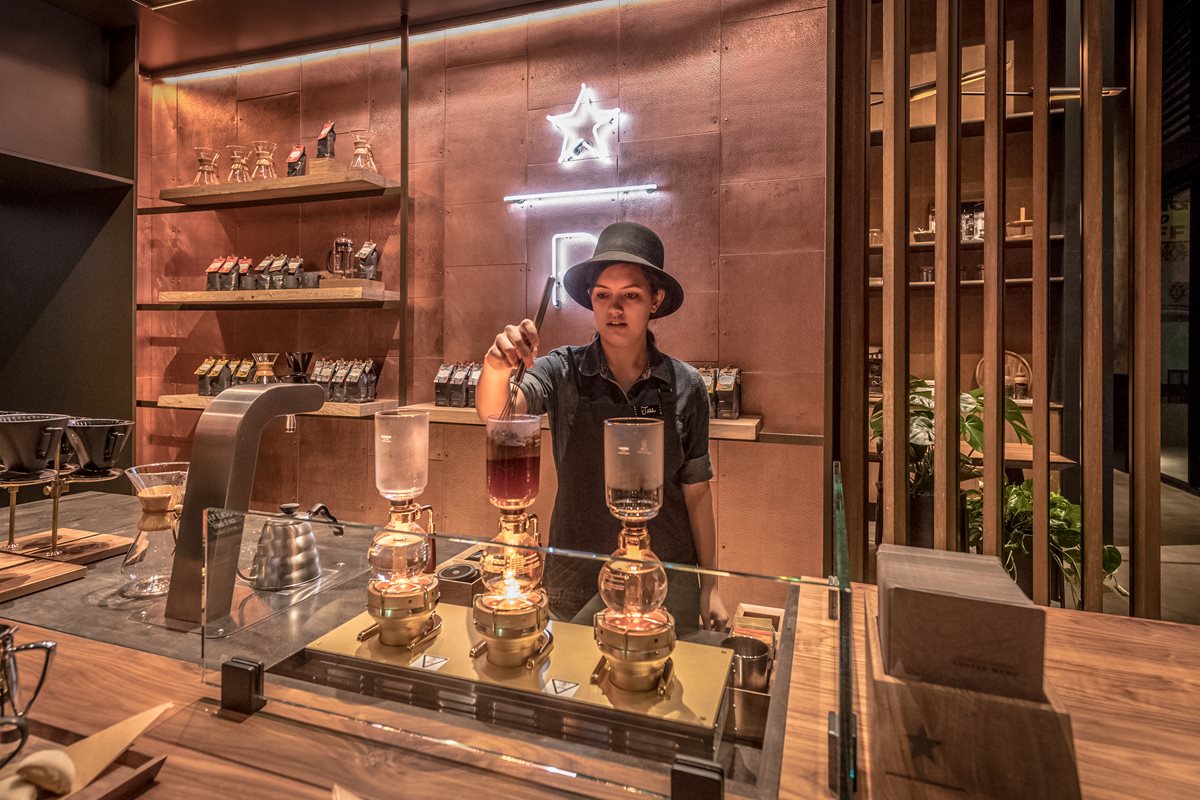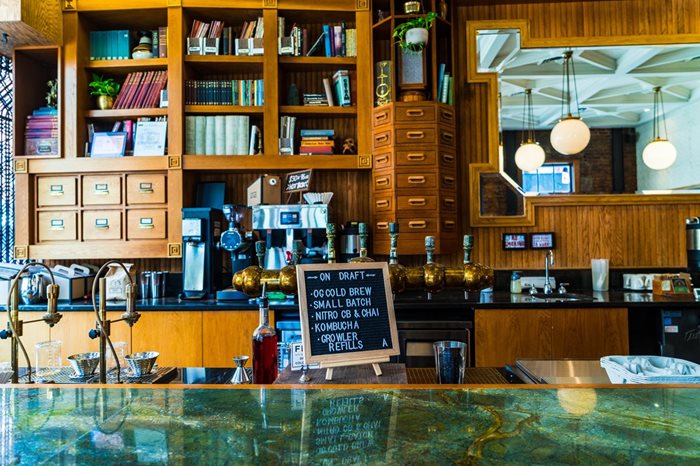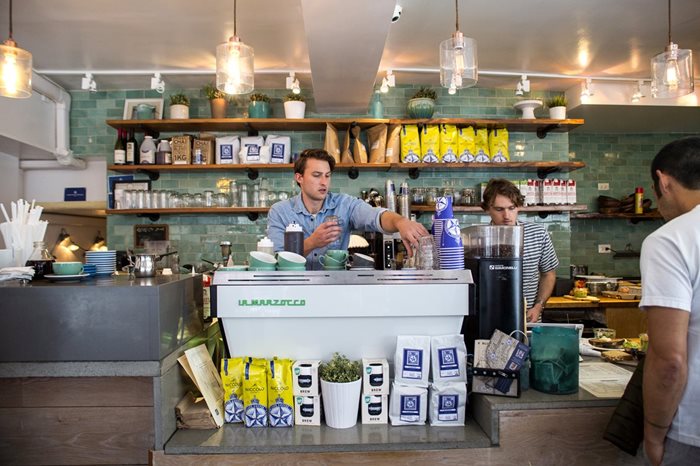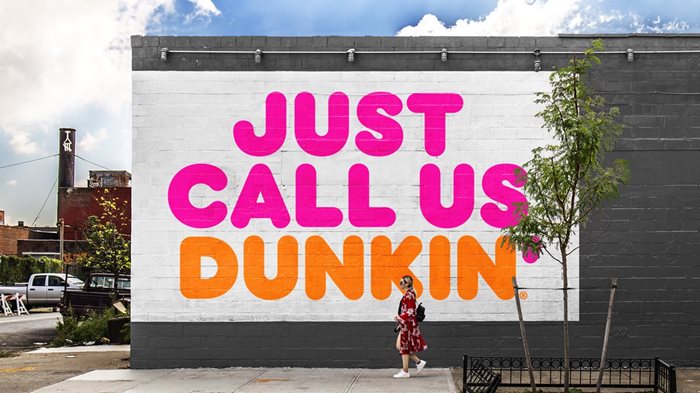As World Coffee Portal releases Project Café USA 2019, our definitive report on the US branded coffee shop market, we examine five key trends that are shaping the sector today. By Tobias Pearce
-(1).jpg.aspx?lang=en-GB&width=700&height=466)
A Starbucks Reserve store in Los Angeles, USA
1. Coffee shop market consolidation
As the US coffee shop market has grown, so too has the influence of a powerful group of domestic and international companies vying for market domination. The last 12 months has seen sustained M&A activity and consolidation across the US branded coffee shop market, with the combined market share of just three companies growing to nearly 80%.
When it comes to US coffee market consolidation its difficult not to mention JAB Holdings. The German-owned private investment firm has built a sizable coffee empire over the last 18 months, carving out new supply chains and markets for its growing legion of coffee brands, which include the soft drinks, ready-to-drink (RTD) and online retail sectors.
In April 2018 JAB Holdings open a new front in e-tail, targeting tech-savvy Millennials with its
undisclosed investment in online retailer, Trade. Then in July the conglomerate
merged its Keurig Green Mountain and Dr Pepper businesses to create the third-largest beverage company in the US with revenues of approximately £11bn.
Starbucks retains a princely 40.1% share of the US branded coffee shop market
The investment firm also aggressively expanded into the US food-focused segment,
acquiring UK-based food-to-go chain, Pret a Manger, and its 92 US stores for a rumoured $1.9bn in June. Today JAB Holdings owns nine-food focused brands in the US, including five of the ten largest by store numbers in the US market – Panera Bread, Einstein Bros. Bagels, Krispy Kreme, Au Bon Pain and Bruegger’s Bagels.
Add those to JAB Holding’s coffee-focused businesses, which include Peet’s Coffee and Caribou Coffee, the fourth and fifth largest by store numbers in the US, and the investment firm's total US branded coffee shop chain business has annual revenues of $7.8bn with a total of 4,660 stores across 13 US branded coffee shop chain brands.
This makes JAB Holdings the third-largest branded coffee chain business in the US – still dwarfed by Starbucks’ 14,290 stores and $20.4bn annual revenues and some way behind Dunkin’ Donuts' 9,261 stores and $9.2bn annual revenues. Combined, these three giants control a massive 79.2% share of the US branded coffee shop market. However, despite flattening comparable sales in the US and
higher than average store closures over the last 12 months, Starbucks retains a princely 40.1% share of the US branded coffee shop market.

Cold brew and nitro are vastly outpacing latte and hot black coffee growth
2. Growth in specialty coffee, cold brew and dairy alternatives
Premiumisation is in full swing across the US branded coffee shop market. Higher quality espresso-based beverages are becoming ubiquitous among fast-food chains and vending machines while specialty concepts like single origin and cold brew are gaining traction among increasingly adventurous consumers. In fact, growth in specialty coffee is currently the leading US coffee shop trend according to industry leaders surveyed by Allegra in 2018.
Supporting this view, nearly a quarter of consumers surveyed said coffee quality was the biggest impetus for repeat coffee shop visit, indicating that the days of stewed filter coffee refills could be soon be numbered in the US. Indeed, most major chains have introduced premium products as part of strategies to boost growth. This suggests specialty coffee influence is percolating into the mainstream and raising standards across the US coffee shop market.
US Consumers are now more likely to choose almond milk with their coffee instead of fat-free dairy milk
And while sales growth for many standard hot coffee beverages have gone off the boil, over 80% of industry leaders surveyed by Allegra say cold brew is the fastest growing product in US coffee shops. Once confined to the summer months, many younger consumers now prefer to take their daily coffee cold, with Allegra research showing nitro and RTD sales growth vastly outpacing flat whites, lattes and hot black coffee.
Further indicating the increasing popularity of cold brew in the US, both Starbucks and Dunkin’ announced strategies in 2018 to increase traditionally slow afternoon sales through the introduction of iced coffee and cold brew. Even non-specialists are buying into the cold coffee craze, with McDonald’s announcing in October 2018 it would trial the beverage across 74 San Diego stores.
Heightened societal emphasis on health, wellness and the environment is also driving increased consumption of non-dairy alternatives in the US. Consumers surveyed by Allegra are now more likely to choose almond milk with their coffee instead of fat-free dairy milk, with nearly 10% opting for the plant-based product.
 A Bluestone Lane store in New York, USA
A Bluestone Lane store in New York, USA
3. 5th Wave influence
With a focus that is fundamentally commercial, the 5th Wave is an emerging business philosophy championing hyper-professionalism and delivering boutique concepts at scale. US operators are at the forefront of this new era of business excellence, bringing world-class specialty coffee shop experiences to the masses as never before.
Growing from a single site in California, Blue Bottle Coffee now has 52 outlets and has opened a roastery in Japan, making it the first 5
th Wave operator to expand internationally. In 2017, food and beverage giant Nestlé acquired a 68% share in the chain, demonstrating the attractiveness of scaled boutique coffee shop businesses as robust investments. Similarly, the acquisition of Intelligentsia Coffee and Stumptown by JAB Holdings set the stage for huge international firms to scale artisan concepts to sizes not yet seen in the global coffee industry.
Major coffee chains now face the conundrum of evolving their proposition without compromising core brand identity
Founded in New York in 2013, today Bluestone Lane operates more than 30 sites across the US, including San Francisco, LA and Washington DC. The coffee chain has been hugely successful in assimilating 3
rd Wave Melbourne café culture to create a premium lifestyle brand offering artisan coffee in a boutique store experience.
In 2018 Bluestone Lane received a reported $19.5m investment from private investment firm, RSE Ventures, to double its footprint in the US. Bluestone Lane founder, Nicholas Stone, described the investment as ‘transformative’, and even hinted it could carry the brand overseas.
Meanwhile, even Starbucks is tapping into 5
th Wave thinking with its premium ‘Reserve’ concept, which marks a distinct evolution in the coffee’s giant’s brand narrative. It also highlights the growing fragility of big chain ‘cookie cutter’ business models for which there is evidence many consumers are shunning in favour of more tailored in-store experiences –
Dunkin’ Donuts and
Tim Hortons both reported stagnant US comparable sales in 2018, with Starbucks also facing a turbulent year until
announcing positive Q4 results in November. Major coffee chains now face the conundrum of evolving their proposition for more discerning consumers without compromising core brand identity.

A Dunkin' store painted with the new shortened logo as part of a marketing campaign in September, 2018
4. Coffee-focused strategies and branding
Driven by consumer interest in health and wellness and a raft of popular new products, coffee is competing in non-traditional sectors and dayparts via new RTD products, including cold brew and nitro. In response to this trend, many non-specialist coffee operators, and even food and beverage firms, are strategically pivoting their growth strategies and branding toward coffee.
In May 2018
Nestlé paid Starbucks $7.1bn to market the US coffee chain’s at-home products globally, a business which generates $2bn in sales annually. Dubbed the ‘Global Coffee Alliance’, the deal is yet more evidence of the growing importance of coffee-based growth strategies in the US and around the world.
Coca-Cola’s agreement to acquire UK-based coffee shop chain Costa Coffee for $4.9bn in August further emphasised the growing commercial clout of coffee in the US. Costa has some 4,000 outlets globally but is currently absent from the US market. This is something the US beverage giant will likely change, with the potential for US store openings, RTD and coffee pod distribution and expansion of Costa’s ‘Express’ vending machine business all on the cards for 2019.
McDonald’s continues to grow its McCafé brand and remains one of the few non-specialist chains to advertise 100% Arabica beans
2018 also saw Peet’s Coffee and Tea rebrand to simply ‘Peet’s Coffee’, highlighting the café’s premium coffee credentials with the slogan ‘the original craft coffee’. McDonald’s too has continued to grow its McCafé brand and remains one of the few non-specialist chains to advertise 100% Arabica beans. Early 2018 also saw the fast-food giant roll out RTD versions of its McCafé Frappé range in partnership with Coca-Cola.
But 2018’s most prominent coffee-focused rebrand was 68-year-old chain
Dunkin’ Donuts' decision to drop the latter part of its name across its 9,000+ store US portfolio. Broadening their brand bandwidth will increase ‘Dunkin’s’ manoeuvrability to compete with major US coffee shop rivals, Starbucks and Tim Hortons. A major plank of the rebrand includes a $100m strategy to sell premium espresso-based beverages, cold brew and nitro coffee – products the chain has identified as part of its ‘blueprint for growth’ in the US.
.jpg.aspx?lang=en-GB&width=700&height=466) Photo: Matt Miller
Photo: Matt Miller
5. Sustainability and farmer profitability
Sustainable coffee became an important topic in 2018. As the global coffee commodity prices fell to record lows, the plight of struggling coffee farmers around the world made headlines –
as did the looming threat to coffee supply chains. While around only a third of US industry leaders report sustainability and environmental issues affect their business to a large extent, nearly three-quarters surveyed believe ethical coffee is growing in importance among consumers. In 2018 nearly 40% of consumers surveyed by Allegra cited ethical certifications as an important factor behind coffee choice.
The growing farmer profitability crisis has prompted large chains to secure supply chains with financial aid
While initiatives such as Direct Trade have traditionally been the preserve of specialty coffee, the growing farmer profitability crisis has prompted much larger chains to secure supply chains with financial aid. In September 2018, Starbucks took the unprecedented step of committing $20m to supplement the income of its struggling suppliers across Nicaragua, Guatemala, Mexico and El Salvador. Shortly after, Dunkin’ Donuts announced a five-year agreement with World Coffee Research (WCR) to contribute around $2m in coffee sales to the non-profit’s sustainability efforts.
Highlighting the increasingly crowded sustainable accreditations sector,
Rainforest Alliance and UTZ announced plans to merge in February 2018. The merger, which seeks to slash bureaucracy, will see the UTZ logo phased out and replaced with New York-headquartered Rainforest Alliance branding. Many US coffee brands, including McCafé, Caribou Coffee and Keurig already use Rainforest Alliance certification, but other, mainly European brands, such as Douwe Egberts, Jacobs, Kenco, Lavazza and Tchibo will eventually need to replace UTZ logos on their products with the new Rainforest Alliance standard.
